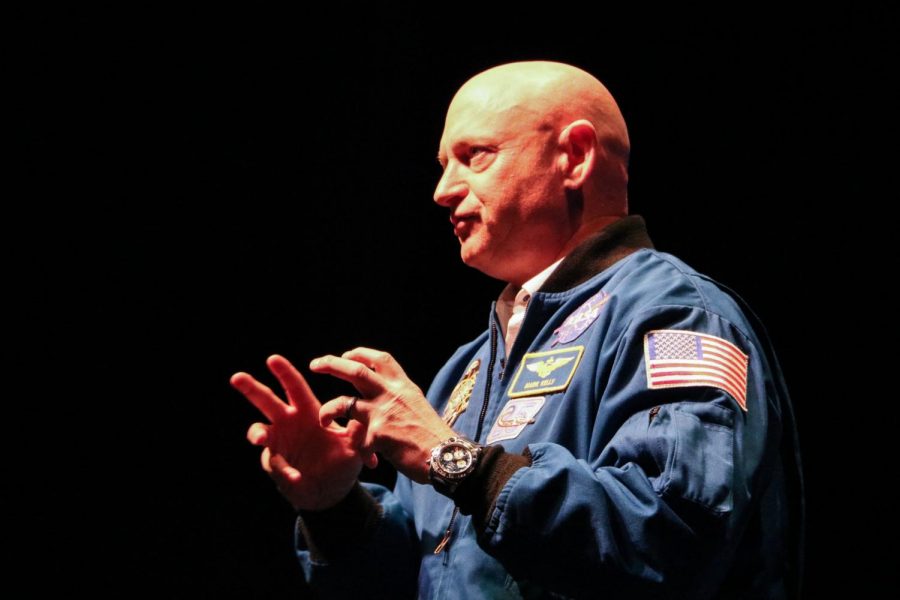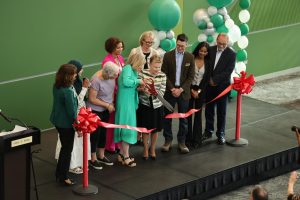Astronaut Mark Kelly: The making of an American Senator?
Former astronaut Mark Kelly speaks at the College of DuPage, bringing audience members on a voyage, explaining how the lessons he’s learned throughout his life have shaped the leader he has become
February 20, 2019
“It’s an amazing thing to see, this big, round, blue planet in the blackness of space. The first time I saw this, it really hit me: all 7.5 billion of us live on an island in our solar system. We really need to take better care of this planet.”
Former astronaut Mark Kelly discussed the life-altering lessons amassed over his career for NASA, a Navy pilot and marriage to former Arizona Democratic Congresswoman Gabrielle Giffords. Speaking before the McAninch Arts Center of College of DuPage on Feb. 17, Kelly explained the cosmic perspective one experiences while orbiting the world and watching the sun rise and set every 90 minutes.
Launching on four space shuttle missions, Kelly commanded both the Endeavour and Discovery Space Shuttles. Spending more than 50 days in space, striving to push humanity forward, Kelly has now decided to serve his country in another way.
“What I learned from my wife is how you use policy to improve people’s lives,” said Kelly in his launch video, declaring his official campaign for senator of Arizona. Kelly is running for the Democratic nomination to fight for the vacant seat left by Republican Sen. John McCain’s death.
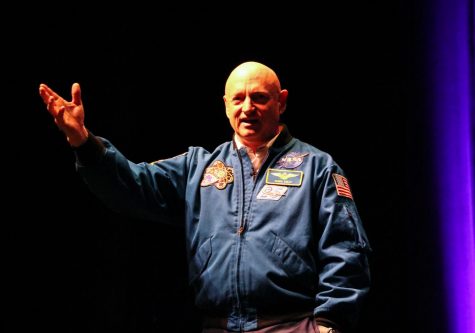
Kelly said the accomplishments in his career serve as testament to the power of perseverance and self-belief
Kelly’s video addresses affordable healthcare, wage and job growth, the economy, and climate change as central tenets to his platform. He expressed the willingness to confront partisanship and polarization while working to eliminate gerrymandering and corporate money in politics.
Carrying the video’s spirit of combatting what many Democrats view as the current administration’s political retreat from science, data and facts, Kelly enlightened the audience with tales of his illustrious career.
While never mentioning his senatorial campaign, Kelly expressed all the qualities that position him for a career further serving the American people.
Describing his humble upbringing in 1970’s New Jersey, Kelly explained the honor and inspiration he felt in his mother becoming one of the first female police officers in the state’s region.
“This was the first time in my life I saw the power of having a goal and plan, and what it meant to work hard at something,” said Kelly. He attributes this motivation for giving him the encouragement to challenge unlikely odds.
He praised this determination for helping him through his initial struggles as a Navy pilot after graduating with highest honors from the United States Merchant Marine Academy in 1986.
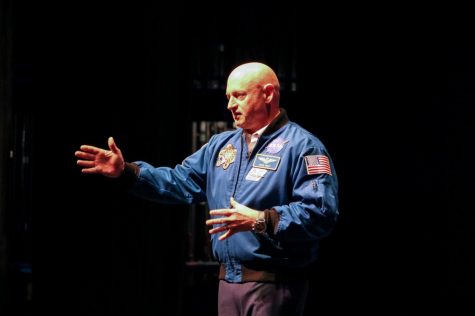
Highlighting the courageous acts of others in his life, Kelly explains how crucial their inspiration was in helping him find the qualities necessary to lead and serve others
“How good you are at the beginning of anything is not an indication of how good you can become,” said Kelly. “I’m a prime example of someone who was able to overcome a serious lack of aptitude with practice, persistence and not giving up.”
He paralleled this defiance when asked by an eighth-grade girl from the audience how to become an astronaut.
“Don’t let anybody deter you from getting there,” Kelly told the student. He recommended she study math and science, get operational experience and never be afraid to pursue her dreams.
Kelly continued to explain crucial qualities he’s developed from the context of his life experiences.
Learning to focus on a military target while avoiding Iraqi surface-to-air missiles during the Gulf War in 1991 helped Kelly compartmentalize objectives. Avoiding being shot down taught him to focus on what he had control over, and not worry about things outside his control. His efforts to dodge artillery included a lapse in communication, resulting in his plane being labeled an enemy combatant by Navy radar and almost being shot down by friendly fire.
“I’ve thought about that night in every job I’ve had, whether in the Navy or NASA,” said Kelly. “I learned there is never an excuse for not communicating with the people you work with. Timely and accurate communication is important in everything, especially in things that are operationally complex.”
When questioned by an elementary student from the audience about the best part of being an astronaut, Kelly highlighted working as a team to accomplish difficult goals.
“Teamwork is how we need to solve all problems, whether it’s a problem in space or a political problem on Earth,” said Kelly.
Kelly’s political passion is inspired by his wife, who survived an assassination attempt while serving in Congress. Following the 2011 mass shooting, which killed six people and injured 13 more, the couple became prominent gun regulation advocates.
Together they founded the Americans for Responsible Solutions non-profit, established after the 2013 Sandy Hook Elementary School shooting, which took the lives of 20 children and six school members. In an attempt to reduce gun violence, the organization has worked to close gun-purchase loopholes and implement background checks for every sale. The organization has since merged to become the Giffords Law Center to Prevent Gun Violence.
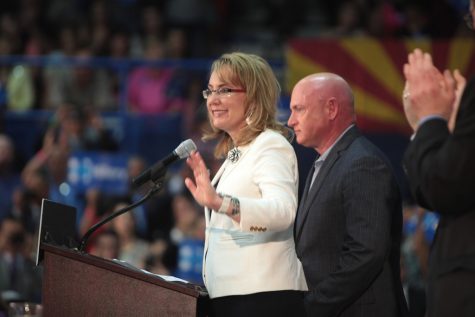
After the 2017 Las Vegas mass shooting, killing 59 people, Kelly preached for political action.
“We don’t have to accept this as normal; it’s not normal; it’s not inevitable. It’s an epidemic that needs to be cured,” Kelly insisted before a mourning crowd.
Following Gifford’s remarkable recovery, the couple showed their solidarity with the survivors of the 2018 Parkland high school mass shooting at the March for Our Lives rally in Washington D.C.
Before the COD audience, Kelly proclaimed Gifford’s strength demonstrates the power of the human spirit and the willingness to survive against any odds.
“Despite putting a bullet in her head, (the shooter) hasn’t put a dent in her spirit and her desire to make the world a better place,” said Kelly.
Giffords told the shooter at his trial she would trade her own life to bring back any of the six individuals who lost their lives, especially 9-year-old Christina-Taylor Green.
Her stoic commitment to help others was displayed seven months after she was shot, traveling to Congress to vote on a bill to raise the debt ceiling.
“I could not be more proud of my wife, after everything she had been through, to be there that day just to do her job,” said Kelly.
During her emergency surgeries, Kelly was suddenly responsible for making primary caregiver decisions. He had to quickly acclimate to making executive choices under immense pressure. Kelly carefully studied how the doctors made decisions, how their process-making operated.
Kelly observed how to work as a team, yet depend on the lower-expertise workers for advice, eventually working up the chain for deriving the greatest input of opinion.
He believes this collaborative, yet independent structure of teamwork is crucial for defeating the decision errors associated with groupthink.
Kelly attributes such errors in judgment as leading causes for NASA’s Challenger disaster in 1986, costing seven lives, and the Columbia disaster in 2003, killing seven astronauts.
“To improve decision making, NASA built a new conference room for the mission management team, said Kelly. “On the wall, it says, ‘None of us is as dumb as all of us.’”
Kelly believes this mentality ensures every voice gets heard equally and all precautions and risks are best addressed.
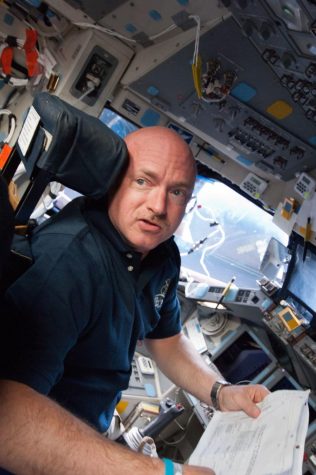
“As a commander of a space shuttle flight, one of the things I do to decrease risk is pay attention to the details,” said Kelly. “We focus on risk reduction with every decision. We try to put the best team together, whether it’s the people working on the spacecraft, people in the mission control center or the astronauts onboard the vehicle.”
Teamwork is exemplified between crewmembers and also international astronauts. Kelly said the International Space State has brought allies and political advisories together for one common goal. Everyone’s voice is united in maintaining their objectives and ensuring the safety of all those involved.
Kelly requires all training crewmembers to constantly question his decisions. Anyone who has a different opinion on safety or mission success is always encouraged to speak up.
Kelly said collaboration is crucial for reducing risk because launching into space is almost as dangerous as the WWII soldiers who stormed the beach at Normandy on D-Day.
Contemplating this risk, Kelly had to decide whether to fly back into space for his final mission while Giffords was still rehabilitating.
The audacity of her courage made his decision all but inevitable.
Kelly believes the desire to serve and the strength to sacrifice for the well-being of others must always be held in the highest regard. He looks to make this drive central to his senatorial candidacy.
This commanding sentiment was echoed in Giffords relayed message and Kelly’s final words to the audience.
“Be bold. Be courageous. And be your best.”
(Mark Kelly: Space’s effect on the human body)
Kelly and his identical astronaut twin brother, Scott, participated in a groundbreaking NASA study on the effects of lengthy space travel on the human body. After more than a year in orbit, Scott’s body was compared to Mark’s, which remained on Earth.
“When he came back, he was all messed up. There was a change in his epigenetics, the way our genes turn on and off. It wasn’t really a DNA change, just a change in gene expression. Because all his muscles didn’t have to work in zero-gravity, he dealt with constant swelling when back on Earth. His heart mass shrunk by around 2% in space. It took him over a year to rehabilitate. If we are going to send people to Mars, we have a lot more to learn. We can’t send them on a trip that will kill them. For longer voyages, we might have to create an artificial gravity by rotating the spacecraft,” said Kelly.

